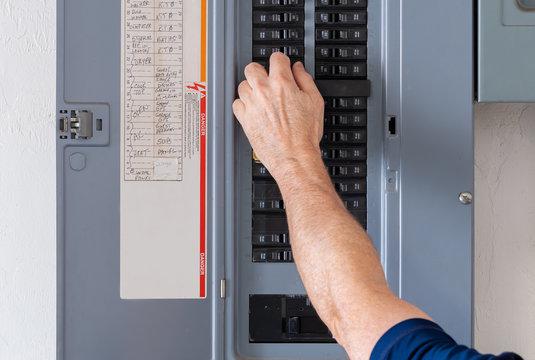Before the holiday season arrives, it's likely you're prepping your home for having extra guests. While routine plumbing inspections and HVAC service are common, one service many people overlook is an electrical inspection. Below, we’ll provide a simple checklist you can use to prep your electrical system for the holiday season.
Take Note of Electrical Problems
Over the years, you may experience small electrical problems with your home that you've been putting off getting repaired. This could be things like experiencing a circuit breaker that keeps tripping or dimming lights when you're using multiple appliances. Now is the perfect time to sit down and make a list of these problems so you can share it with our electricians.
Be Mindful of Overloading Electrical Circuits
During the holiday season, it's likely you'll be putting up different decorations and increasing the demand on your electrical system. One thing to keep in mind is that you don't want to overload any of your electrical circuits. Most home electrical circuits are between 15 and 20 amps. To put this into perspective, for continuous loads (3+ hours), a 15-amp circuit safely supports about 1,440 watts and a 20-amp circuit about 1,920 watts. It can be helpful to add up the electrical demand of everything you have on that circuit to ensure that you're not exceeding these safe limits.
Avoid Daisy-Chaining
Daisy-chaining is the process of plugging multiple items into each other. You can safely connect holiday light strings together, but only up to the manufacturer’s recommended number of connections. You should never daisy-chain multiple extension cords or power strips together. This can lead to dangerous overheating and increase the risk of an electrical fire.
Always Inspect Electrical Cords
One general rule to keep in mind when you decide to use any electrical item is that you need to inspect its cord first. This includes everything from lighting strips to power strips and extension cords. If you notice any pinching in the cord, exposed wiring, or any other damage, you should avoid using that particular item.
Choose the Right Rating
With outdoor holiday lighting being one of the most popular practices homeowners participate in during the holiday season, it's no surprise you may want to, too. However, it's imperative that you select the appropriate cord rating depending on your usage situation. All electrical items will have an indoor or outdoor rating. Those rated for outdoor use can withstand UV radiation and moisture. While it's completely possible to use outdoor-rated electronics indoors, you can never utilize indoor-rated electrical devices outside.
Know Your Extension Cord Limits
All extension cords will have a maximum amperage that they can handle. Whenever you're plugging items into your extension cord, it's imperative that you understand the amperage the item needs. You never want to plug in an item that draws a higher amperage than the electrical cord is rated for. This can lead to dangerous overheating and an electrical fire.
Use Cords Safely
If you'll be running items outside or even inside your home where you need to move the cord out of the way, be mindful of where you put it. When it comes to outside cords, they should be in a location free from pooling water or foot traffic. Many people opt to use staples to hold their electrical cords in place. While these are perfectly safe when used correctly, they can be dangerous when used incorrectly. When securing cords, fasten staples gently without piercing or compressing the insulation. The staple should hold the cord in place but never touch or pinch it. Driving a staple too hard can damage insulation and increase the risk of short circuits or fire.
Get an Electrical Inspection
Another must-do on your homeowner checklist is scheduling an electrical inspection. This is where one of our electricians comes out to your home and inspects all the different components of your system. This will allow us to catch any potential issues while they're small and easy to fix. Inspections also help verify code compliance and ensure your home is ready for added holiday electrical loads.
Ensure GFCI Protection
GFCI protection is required in areas where water is present, including bathrooms, kitchens (within 6 feet of sinks), garages, basements, laundry areas, and all outdoor outlets. These outlets are specifically designed to cut off the power to prevent electrocution when a ground-fault occurs. You can easily identify a GFCI outlet by its distinctive test and reset buttons and rectangular shape. In some cases, you may have GFCI protection at the circuit breaker instead of the outlet itself. The circuit breaker will have test and reset buttons. It's highly advisable to test each GFCI outlet or circuit breaker to ensure that it’s working correctly. Start by hitting the test button (with a device plugged in so you can confirm it turns off). Once you verify that the outlet or circuit breaker is shutting off, go ahead and hit the reset button to restore functionality.
Consider a Whole-Home Surge Protector
There's no doubt that electrical holiday decor can be quite expensive. One of the best things you can do to help preserve the integrity of these items is to get a whole-home surge protection device. This device gets installed right at your electrical panel box, where it can protect all the circuits in your home. Whole-home surge protectors detect sudden voltage spikes and divert excess electricity safely to ground before it reaches your appliances and electronics. When the demand for your local power grid increases during the holiday season, with everyone using outdoor lighting, a surge protector can be particularly helpful. Without it, a power surge when your local grid goes down and back up can cause permanent damage to your electrical items. A whole-home surge protector helps prevent that damage and protect your financial interests.
Ensure Your Panel Box Is Appropriately Labeled
One other item you want to add to your electrical safety checklist is your panel box. It's best to check that all your circuit breakers are appropriately labeled for what is on that circuit. While you may know what's on it, you always want to ensure that any emergency personnel also know. This ensures everyone's overall safety.
Evaluate Your Safety Devices
Another must-do to ensure your home is ready for the holiday traffic is to evaluate your electrical safety devices. If you have replaceable-battery smoke and carbon monoxide detectors, install fresh batteries at least once a year and test each unit. If you have newer sealed 10-year detectors, test them monthly and replace the entire unit when it reaches its expiration date. Additionally, check the expiration date on your fire extinguisher and ensure you have at least one multi-purpose (ABC-rated) extinguisher on every level of your home.
Reliable Electrical Inspection Services
Mister Sparky® provides expert electrical inspection services for the Evansville, IN community. We can also assist with all your electrical repair, installation, and replacement needs. Just call our office today to schedule your next service consultation.















